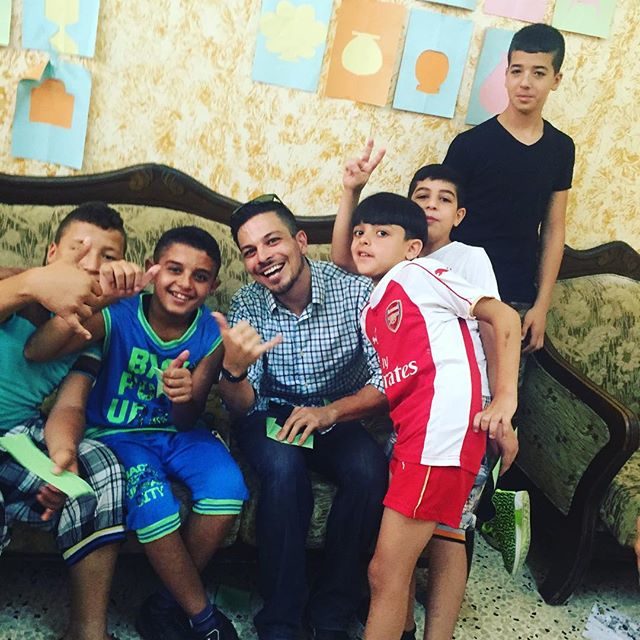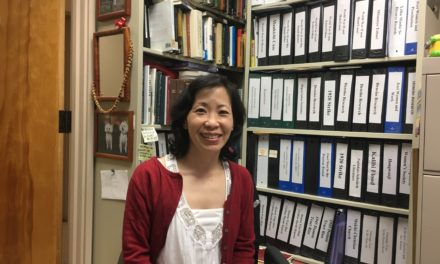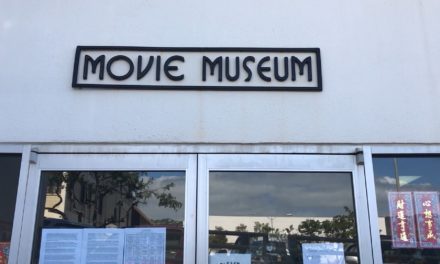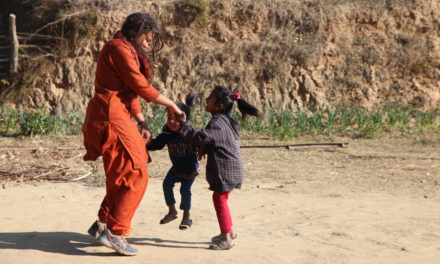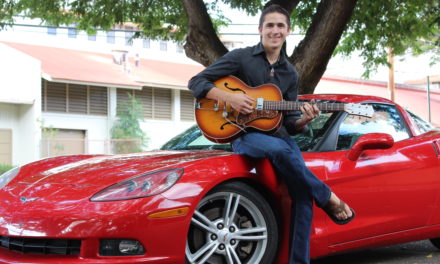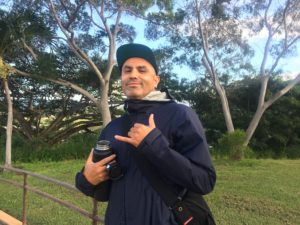By Lexus Yamashiro | Staff Writer
In the summer of 2014, Zach Giano traveled to Palestine in Israel with a friend, where they took a cab ride into the city of Bethlehem. The driver began to make a conversation, asking Giano “What’s life like outside the wall?” The question puzzled Giano since he was unaware of this “wall.” He came to learn that Israel built a wall around Palestine and its people, preventing Palestinians from leaving and making them refugees.
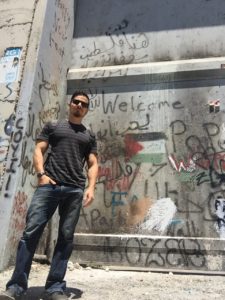
Giano standing next to the wall that surrounds Palestine and its people. (Photo courtesy of Zach Giano)
Being compelled by what he had heard from the cab driver led Giano to feel compassionate for the Palestinian refugees. He wanted to somehow give back to the community in terms of giving its people an education and life that they don’t get to experience as much anymore.
While the plight of refugees is a controversial topic now that President Donald Trump signed an executive order in late January that temporarily banned travel for citizens from seven Muslim-majority countries (Iraq, Iran, Libya, Somalia, Sudan and Yemen; Syrian refugees have been banned indefinitely), Giano’s first-hand experience with refugees has given him insight into their lives and living conditions.
“Refugees always get the short end of the stick. They are displaced from their home, made to live in callous conditions, and are wrongly labeled terrorists, troublemakers, and a burden to society,” said Giano, a KCC professor in Communications, in an email. “To add insult to injury, just when the United States dangles the carrot of freedom to these people we take it away. We have selfishly benefitted from the freedom that we deny others. Unless one identifies as Native American/Native Hawaiian, we are refugees ourselves that came from a land that wasn’t previously ours. My heart goes out to the people being sent back, and I hope our government recants this egregious policy.”
In 2016, two years after his first trip to Palestine, Giano found himself googling for a volunteer effort that reaches out to refugees. He eventually stumbled upon Project Hope, a humanitarian organization that teaches English to Palestinian youth while in remote villages and/or refugee camps in Palestine. The organization was looking for a wide range of volunteers who were capable of teaching English.
After a few interviews, Giano — along with 15 other volunteers — was accepted into Project Hope to which it allowed him six weeks to volunteer in Palestine to teach English, Math, and a Microsoft Excel course through a computer lab belonging to the humanitarian organization.
He began his volunteer work on July 1, 2016 through Project Hope, giving him the opportunity to teach Palestinian youth and adults while simultaneously experiencing and learning about Palestine’s culture and hardships that it faces every day.
“They don’t have much, it’s very third world and they deserve [a] quality education just like anyone else,” Giano said.
Giano recalled feeling cautious as he entered this new environment. He was aware of how Palestine was under Israel’s rule, which created a conflict zone, but he felt compassionate as he reminded himself that he wanted to give a quality education to the people of Palestine and in other ways give back in general.
When Giano arrived at the Tel Aviv airport, he was questioned by Israeli officers for about 25 minutes regarding who he was, where he was from, why he was visiting Israel and more. Giano said that he had to lie to get past them, for if he gave away a single clue that he would be doing humanitarian work in Palestine, he would get kicked out of the country.
The officers eventually let him pass through, giving him a sticker with a number on it which indicates the threat level of a person. Giano explained that receiving a “1” meant that the person is not suspicious at all and a “6” indicated that the person is highly dangerous and is banned from the country; Giano received a “5.”
As he made his way along a road that does not allow Palestinians to travel or walk on, he was stopped by an Israeli officer who questioned him on who he was and where he came from. When asked to present his ID, the officer’s attitude had quickly changed, greeting Giano in a more friendly tone after finding out that he was an American.
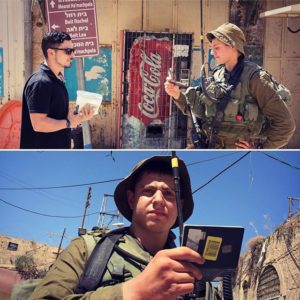
Top: A witness captured this photo of Giano being questioned by the Israeli officer as he was asked to present his ID. Bottom: Giano simultaneously took this photo of the officer secretively as he got his ID checked. (Photo courtesy of Zach Giano)
Giano explained that any Palestinians who are caught walking along these roads are to be questioned by Israeli authorities and in most cases are taken into custody, even for the most minor reason. Being that this was the first time Giano had ever been discriminated (he is a Caucasian male who looked like a Palestinian to the officer), he felt angry as he came to learn that this was how the Palestinian refugees were being treated by Israelis on a daily basis.
“Although that experience wasn’t pleasurable and I was scared, it made me grow as a person,” Giano said. “It was really eye-opening to be discriminated against.”
As Giano continued his way, he recalled that walking through the streets of refugee camps was heartbreaking. He explained how Palestinian refugee camps were different from other camps around the world; the camps of the Palestinians are basically permanent and concentrated.
One of the symbols of the refugee camp is a key, which is seen everywhere, whether it be spray painted on walls, made on T-shirts, and so forth. Giano had asked a Palestinian what this key meant, and he was told that some of the families living in the refugee camp still have the original key to their home in Israel.
“They save the actual keys to their house because they have this hope that they’re going to return one day and get to live in their home,” Giano said.
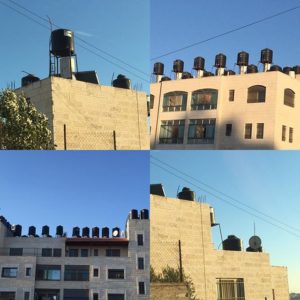
Black containers for water are seen on top of many buildings through the refugee camps. (Photo courtesy of Zach Giano)
While working with an interpreter in Palestine, Giano reached out to little kids and adults. For the adults who participated in Giano’s Excel course, they had to have some knowledge/background in English. Academics aside, Giano said that he was also able to spread aloha, informing his students about Hawaiʻi.
“I went there as a teacher … but really, I feel liked I learned more than I taught,” Giano said. “They got to learn about my culture [and] I got to learn about theirs.”
Throughout his six weeks teaching in Palestine, Giano took the time to speak with different people and families to learn and share their stories through his online blog that he created. Through his interviews, he captured the hardships of what it’s like being a Palestinian, learning that sometimes Palestine had only two days out of a week to access water and often no electricity.
As his blog posts went up, an Israeli accessed his blogs online, warning Giano that he had contacted the authorities and that Giano would get interrogated by the Israeli government once he left Palestine. Giano recalled how it “jolted [his] system,” for what he did was somewhat illegal within that country. He simply wanted to give the Palestinians a voice, and in the end continued to blog and publish new stories online.
Ultimately, Giano was unsure if he had made an impact. As a professor at KCC, he said that he had learned how teachers don’t always see the influence of their work. Giano was worried that he wouldn’t make a difference in the lives of Palestinians, however, his goal was simply to give back as much as he could and to tell their stories.
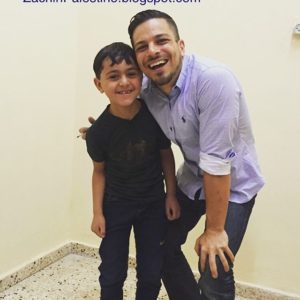
Giano with 8-year-old Azadeem, who is a Palestinian refugee. (Photo courtesy of Zach Giano)
Getting inspiration from his former mentor Nāwaʻa Napolean, he was challenged not to base his curriculum on just a textbook and to make students world citizens. Upon returning to the United States, Giano was able to integrate his experience in Palestine by telling stories and through lectures during class that pertained to intercultural communications.
“Communication is different; not just in different language[s], but in the context of it, and it’s really powerful to recognize,” Giano said.
Although what he experienced in Palestine during his six weeks was sad and touching, Giano was able to gain insight from the Palestinians’ living condition and everyday life.
“The conditions are sad, the stories are sad, but what’s not sad — ironically — are the people,” Giano said. “They are very happy people, and I think it’s because they have to band together; they need each other. … It’s inspiring.”
To learn more about Giano’s experience in Palestine, visit his blog page at http://zachinpalestine.blogspot.com/.

